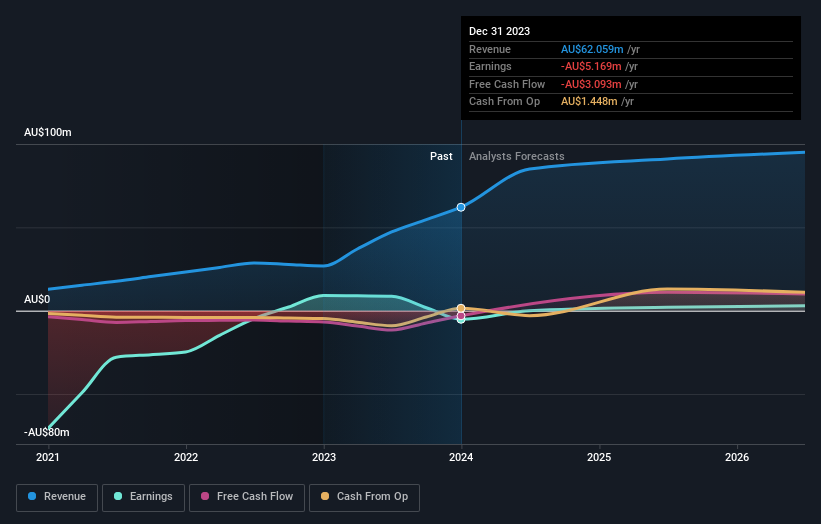- Australia
- /
- Energy Services
- /
- ASX:MCE
The 11% return this week takes Matrix Composites & Engineering's (ASX:MCE) shareholders three-year gains to 161%

It might seem bad, but the worst that can happen when you buy a stock (without leverage) is that its share price goes to zero. But in contrast you can make much more than 100% if the company does well. For example, the Matrix Composites & Engineering Ltd (ASX:MCE) share price has soared 152% in the last three years. Most would be happy with that. And in the last week the share price has popped 11%.
After a strong gain in the past week, it's worth seeing if longer term returns have been driven by improving fundamentals.
See our latest analysis for Matrix Composites & Engineering
Given that Matrix Composites & Engineering didn't make a profit in the last twelve months, we'll focus on revenue growth to form a quick view of its business development. Generally speaking, companies without profits are expected to grow revenue every year, and at a good clip. That's because fast revenue growth can be easily extrapolated to forecast profits, often of considerable size.
In the last 3 years Matrix Composites & Engineering saw its revenue grow at 48% per year. That's much better than most loss-making companies. Meanwhile, the share price performance has been pretty solid at 36% compound over three years. This suggests the market has recognized the progress the business has made, at least to a significant degree. Nonetheless, we'd say Matrix Composites & Engineering is still worth investigating - successful businesses can often keep growing for long periods.
You can see how earnings and revenue have changed over time in the image below (click on the chart to see the exact values).

If you are thinking of buying or selling Matrix Composites & Engineering stock, you should check out this FREE detailed report on its balance sheet.
What About The Total Shareholder Return (TSR)?
We'd be remiss not to mention the difference between Matrix Composites & Engineering's total shareholder return (TSR) and its share price return. The TSR is a return calculation that accounts for the value of cash dividends (assuming that any dividend received was reinvested) and the calculated value of any discounted capital raisings and spin-offs. Its history of dividend payouts mean that Matrix Composites & Engineering's TSR of 161% over the last 3 years is better than the share price return.
A Different Perspective
It's good to see that Matrix Composites & Engineering has rewarded shareholders with a total shareholder return of 38% in the last twelve months. Notably the five-year annualised TSR loss of 1.1% per year compares very unfavourably with the recent share price performance. The long term loss makes us cautious, but the short term TSR gain certainly hints at a brighter future. While it is well worth considering the different impacts that market conditions can have on the share price, there are other factors that are even more important. Take risks, for example - Matrix Composites & Engineering has 1 warning sign we think you should be aware of.
For those who like to find winning investments this free list of undervalued companies with recent insider purchasing, could be just the ticket.
Please note, the market returns quoted in this article reflect the market weighted average returns of stocks that currently trade on Australian exchanges.
New: Manage All Your Stock Portfolios in One Place
We've created the ultimate portfolio companion for stock investors, and it's free.
• Connect an unlimited number of Portfolios and see your total in one currency
• Be alerted to new Warning Signs or Risks via email or mobile
• Track the Fair Value of your stocks
Have feedback on this article? Concerned about the content? Get in touch with us directly. Alternatively, email editorial-team (at) simplywallst.com.
This article by Simply Wall St is general in nature. We provide commentary based on historical data and analyst forecasts only using an unbiased methodology and our articles are not intended to be financial advice. It does not constitute a recommendation to buy or sell any stock, and does not take account of your objectives, or your financial situation. We aim to bring you long-term focused analysis driven by fundamental data. Note that our analysis may not factor in the latest price-sensitive company announcements or qualitative material. Simply Wall St has no position in any stocks mentioned.
Have feedback on this article? Concerned about the content? Get in touch with us directly. Alternatively, email editorial-team@simplywallst.com
About ASX:MCE
Matrix Composites & Engineering
Engages in the design, engineering, and manufacturing of engineered polymer products for the energy, mining and resource, and defence industries.
Moderate and good value.
Market Insights
Community Narratives



